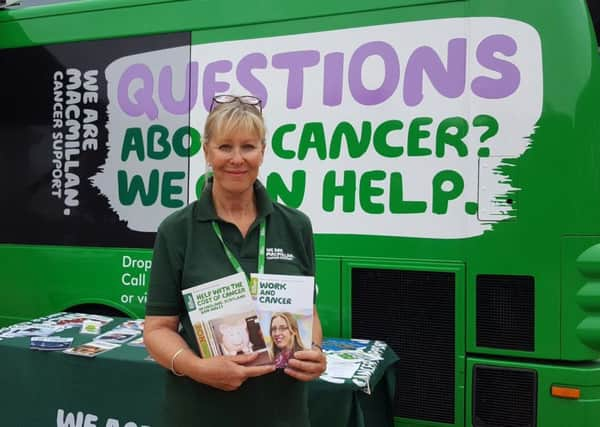Cancer information and support service coming to Crawley


Macmillan Cancer Support’s mobile service will be visiting the area, with cancer information specialists on hand to answer questions and provide information.
A statement from Macmillan said: “The team encourages anyone with worries relating to cancer to stop by, whether you’re living with cancer, or care for someone who is.
Advertisement
Hide AdAdvertisement
Hide Ad“Now that summer is here, the team will also be providing specialist advice and information about sun safety and skin cancer (please note the team will be unable to perform skin checks.)”
Tracey Neill, a Macmillan Information and Support Specialist, said: “Skin cancer, if caught early, is treatable and has one of the highest survival rates of all cancers.
“Being sun aware is key. Our advice is to avoid sun beds, wear a high SPF sun screen with a four-star rating or more so it will block out UVA as well as UVB rays, and cover up in the sun.”
There are two main types of skin cancer: non melanoma and melanoma. Around 136,000 cases of non melanoma skin cancer are diagnosed in the UK each year which makes it the most common type of cancer by far.
Advertisement
Hide AdAdvertisement
Hide AdIt is unlikely to spread, very treatable and the earlier it is diagnosed the easier it is to treat.
Melanoma is the fifth most common cancer in the UK. Around 15,400 people are diagnosed with melanoma in the UK each year. It is more common in people with fairer or freckly skin. Around 27 per cent of new cases occur in people aged 75 and over. Unlike other cancer types, malignant melanoma also occurs relatively often in people of younger ages.
To help keep you safe in the sun, the British Association of Dermatologists advises following these top sun protection tips:
Spend time in the shade during the sunniest part of the day when the sun is at its strongest, which is usually between 11am and 3pm in the summer months.
Advertisement
Hide AdAdvertisement
Hide AdAvoid direct sun exposure for babies and very young children.
When it is not possible to stay out of the sun, keep yourself well covered, with a hat, T-shirt, and sunglasses to give you additional protection.
Apply sunscreen liberally to exposed areas of skin. Re-apply every two hours and straight after swimming or towelling to maintain protection.